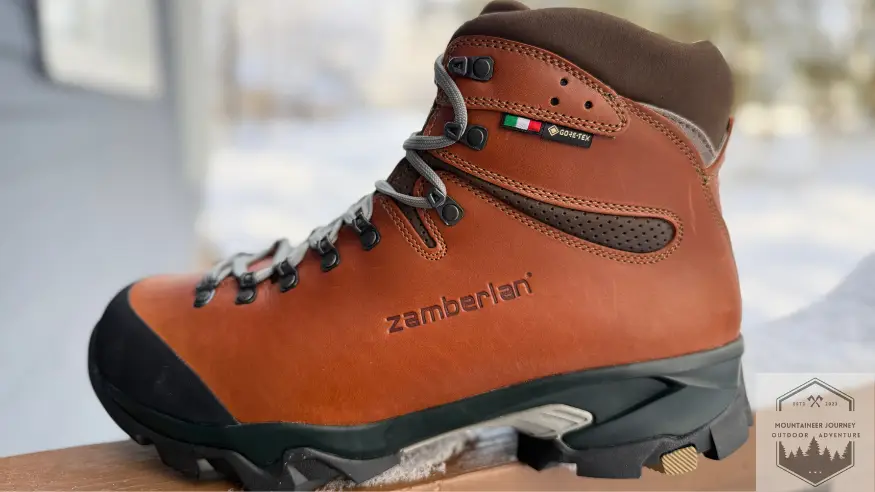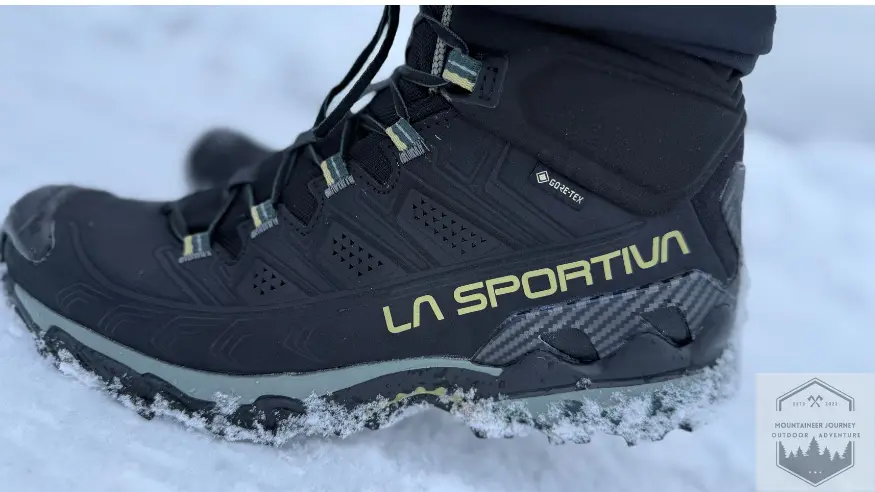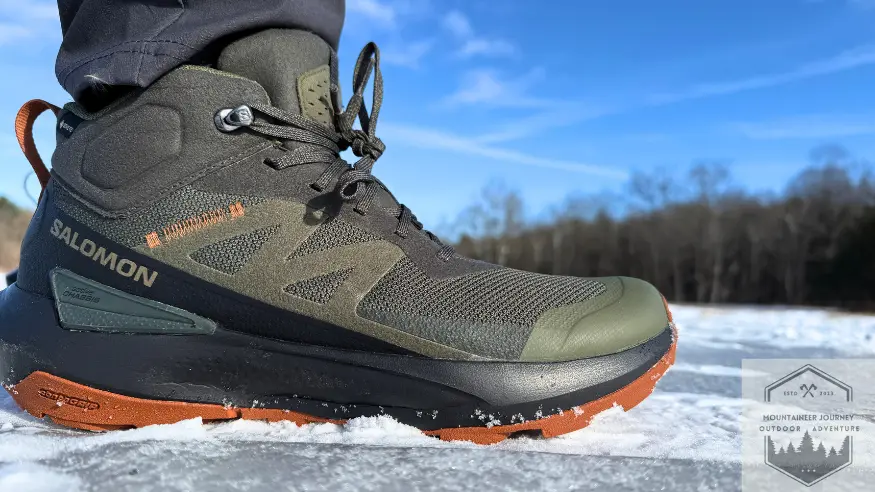Hiking Boots vs Trail Runners | Which To Choose For The Trail?
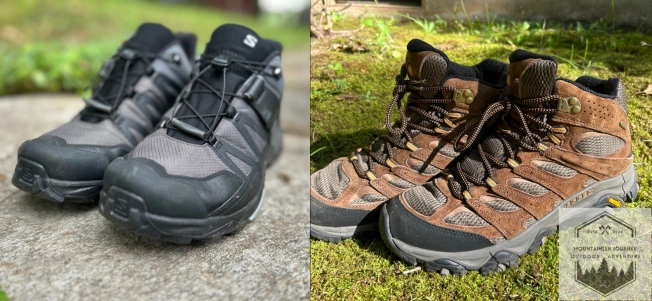
In this article, we will be discussing Hiking boots vs Trail runners. This is a popular debate among hikers, as both are popular shoe types to wear on the trail. I’ve tested many hiking boots and Trail Runners, some of the more popular being the Hoka Speedgoat 5, Hoka Anacapa 2 GTX, Salomon X 4 Ultra, and Merrell Moab 3.
Many of these hiking shoes and trail runners come in various outsoles, such as Vibram and Contagrip. We’ll compare hiking boots and trail runners and cover when to use each of these hiking footwear.
Use Trail Runners If
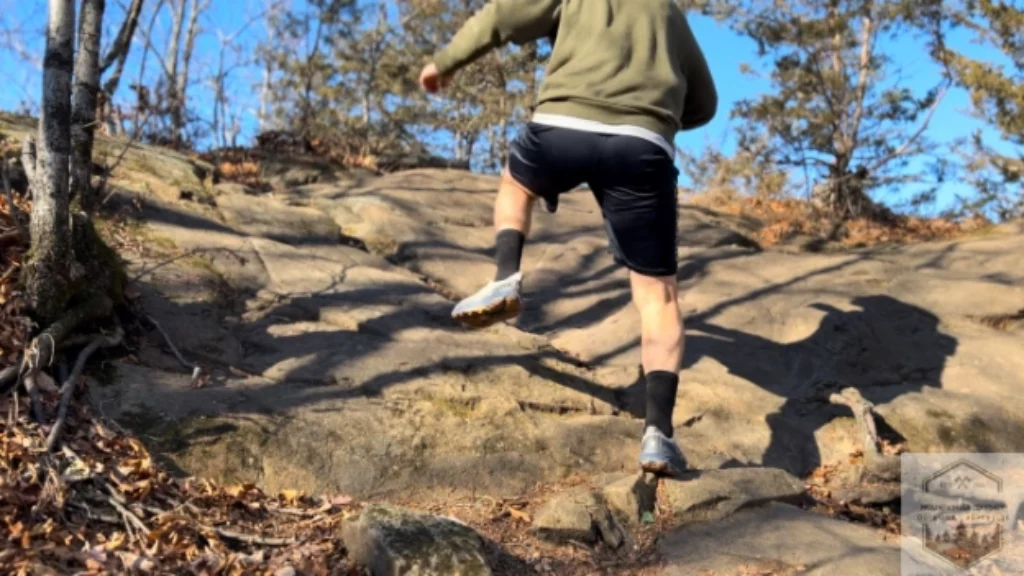
- You want a really lightweight shoe
- You want a very flexible sole
- Breathability is a must for you
- You want to run or move very quickly
- You are hiking or running in warm weather year-round
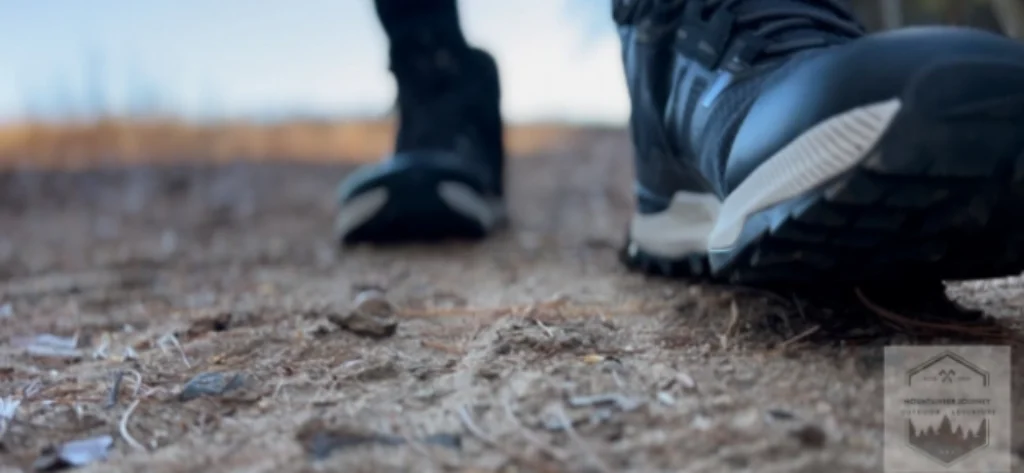
Use Hiking Boots if
- You need more stability on the trail
- You come across very rocky terrain
- You are hiking in hazardous conditions
- You are hiking in colder weather
- You need excellent traction
Trail Runners vs Hiking Boots

When comparing hiking shoes to trail runners, there are many important takeaways. Firstly, the design of Trail Runners incorporates more mesh material, making them lighter than hiking boots that typically blend leather and synthetic materials. Trail runners are typically not waterproof as most hiking shoes are.
The general outsoles used in both trail runners and hiking shoes are identical. See Vibram vs Contagrip for more information. That being said, many trail runners are more flexible in the sole, resulting in less traction than hiking shoes.
Generally, trail runners are more breathable and made with quick-dry materials. On the other hand, boots have a large, robust material subset, they are usually waterproof.
Pro’s of Hiking Boots
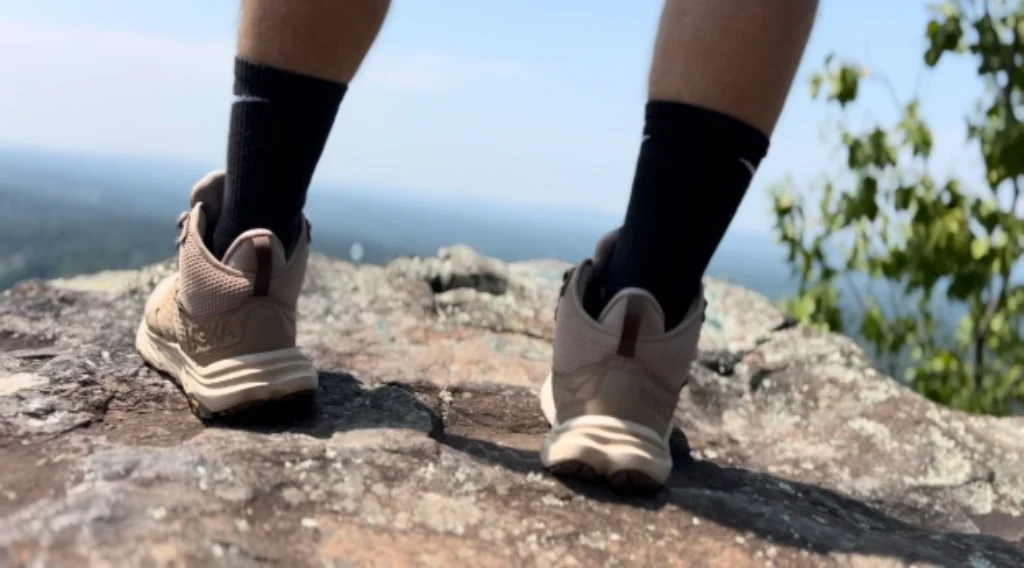
The hiking shoe offers the highest protection during hiking, particularly in mountainous regions. It also provides more stability for the ankles, this is very important in rocky and unstable trails.
They also have an extra strong footbed, protecting the heel against sand or jagged edges if needed. When you are looking for something to use in all four seasons the hiking shoe is the way to go.
Trail Runner Pro’s
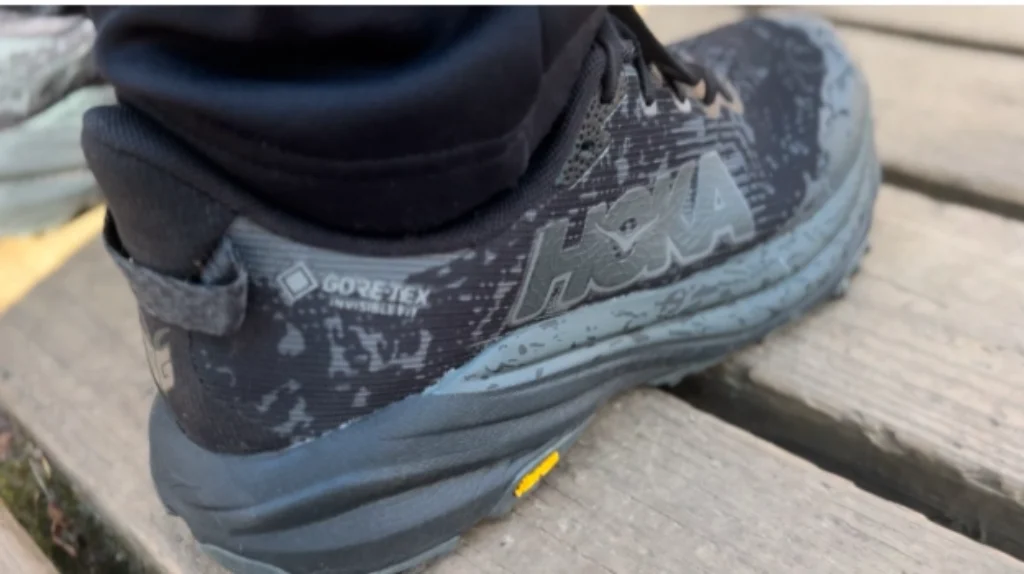
If you want a better solution for heavy hiking shoes and cannot stand the weight or lack of ankle freedom choose Trail Runners. They’re light and springy compared to hiking shoes. Trail running shoes have more breathable uppers than hiking shoes, but offers less protective properties.
If you want to go bushwhacking from the road the Trail Runners are a bad option. Lightness and comfort makes it easier for people to walk around on the street in their sneakers and shoes.
I have used trail runners during my daily errands and they hold up very well on concrete and asphalt. Although, I do not recommend using Trail Runners for everyday tasks as they can wear down easily.
Trail Runners vs Hiking Boots Weight
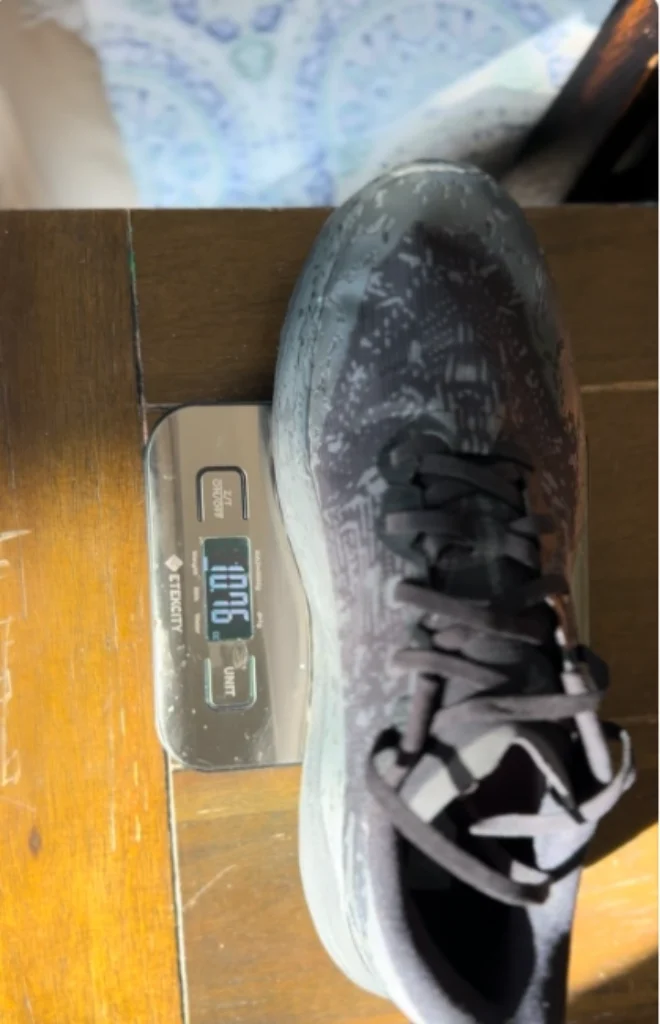
Many trail running shoes are under 2 lb. an of example of such a light trail running shoe is the Hoka Speedgoat 6. The purpose of these shoes is to ensure they are lightweight for running. As I previously mentioned, you can still use Trail Runners for general hiking purposes. Some hiking shoes, such as the Salomon Quest 4, weigh close to 3 lbs. The leather uppers of hiking shoes add weight while also providing stability to the boot itself.
The added weight of hiking shoes provides extra protection against sharp objects on the trail. Because Trail Runners are made of a more synthetic material, you risk hitting your foot against sharp objects or even piercing the mesh material itself. Another benefit of the added weight of hiking shoes is that they are generally more durable than trail runners.
More Lightweight: Trail Runners
More Weight: Hiking Boots
Traction
Despite having the same outsole material, Trail Runners and Hiking Shoes differ in their traction; generally, Hiking Boots have more robust traction due to their extra weight and extra lugs. Trail runners do not have as many lugs or extra weight. Although the design of trail runners aims for decent traction, their lightweight construction often precludes excellent traction.
If you’re on more technical terrain, it’s important to have hiking boots, as they will help against uneven terrain. You can use trail runners on rough terrain, but be aware that their lack of stability and traction can negatively impact your hike.
Hiking Boots Traction: 5 out of 5
Trail Runners Traction: 3.5 out of 5
Winner: Hiking Boots
Stability
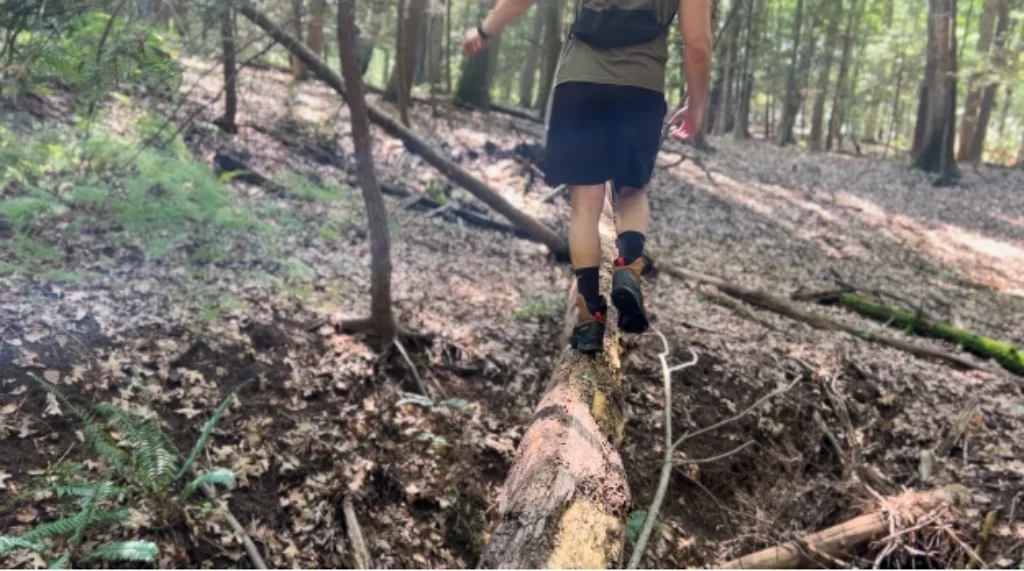
Hiking boots are widely known to have more stability than Trail Runners. What does that mean?
Trail runners generally have no ankle protection. Most hiking boots have at least a mid- or high-top version of the boot. Some hiking boots, such as the Salomon X 4 Ultra, come in a low version, which does not protect the ankle as well. However, trail running shoes often receive criticism for their lack of ankle stability. If you are someone who suffers from ankle sprains, it is best to avoid true running shoes or proceed with caution.
Trail running shoes can come with micro spikes to add stability, especially on technical trains. Trail runners lack the robust outsole that leads to increased stability. While a lighter outsole certainly improves performance on trails, it also allows for a more efficient foot strike.
Trail Runner Stability: 4 out of 5
Hiking Boot Stability: 5 out of 5
Winner: Hiking Boots
Durability
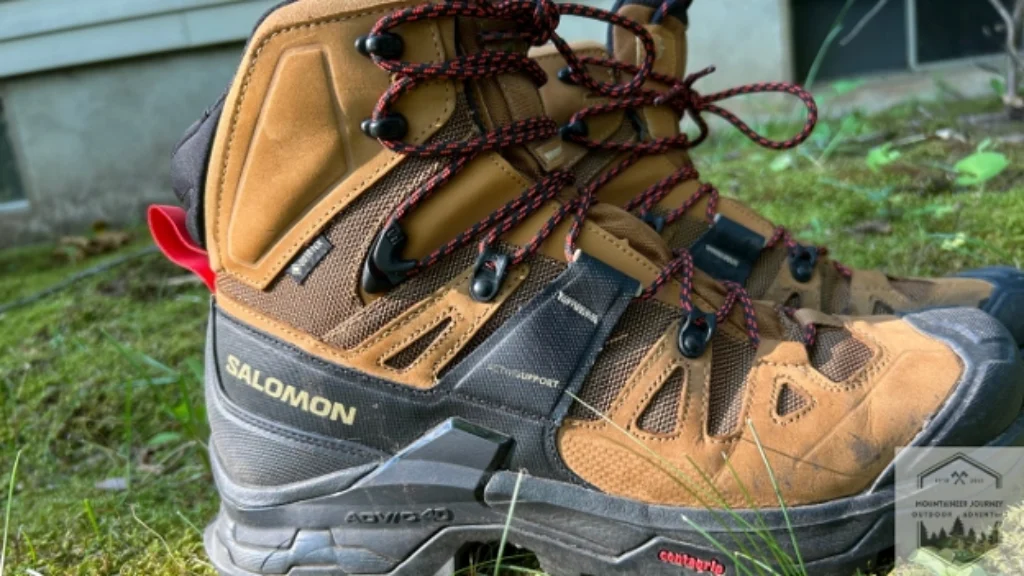
Both hiking boots, and Trail Runners, have provided me excellent durability. I must say, most of my hiking shoes have lasted longer than trail runner shoes. This is due to the material used to make both Hiking Boots and Trail Runners. The synthetic material on Trail Runners tends to wear much quicker.
Most trail runners will last approximately 500 miles a year, as some hiking boots are known to last up to a thousand miles. This greatly depends on the user and how well they take care of both their hiking boots or Trail Runners.
Hiking Boots Durability: 5 out of 5
Trail Runners Durability: 5 out of 5
Winner: Hiking Boots
Hiking Boots vs Trail Running Shoes | Which one to use?
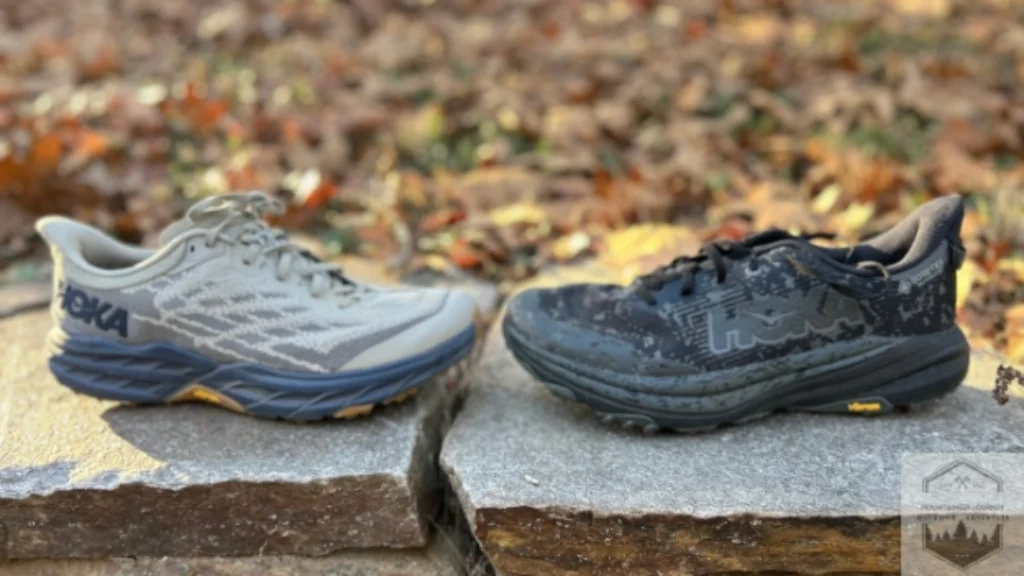
I must say that both hiking boots and trailers are excellent options for different hiking footwear. Trail runners tend to be more lightweight and have less durability. They compensate with subtle foot striking and running aids. However, Hiking Boots are stronger and have better traction.
Depending on your hiking style, you can use either option. If you’re someone who is looking to run on the trails, obviously Trail Runners are a better option.In my opinion, both are excellent options. At the end of the day, it depends on the terrain and your preferences.
My Experience with Trail Runners & Hiking Boots
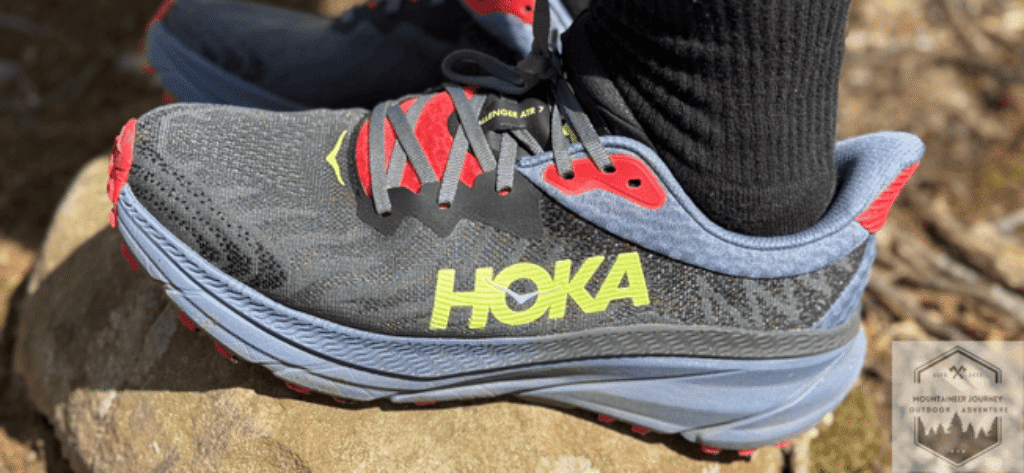
In my vast experience, I have used both trail running shoes and hiking shoes for the past 15+ years while hiking. Both have exceptional use if you are using them in the correct way. Personally, I have been using more hiking shoes because I enjoy the added ankle protection(I’ve had issues with ankle sprains in the past). The Gore-tex version of hiking boots have also been another enticing option for me, as they keep my feet dry.
I will start to use trail running shoes in the summer months, they have exceptional breathability and don’t require a break in period. The Hoka Speedgoat 6 are usually my option to start with in the summer. Whatever boot or shoe I may be using, both trail running shoes and hiking shoes have been integral parts of my hiking experience.
Frequently Asked Questions
Are trail runners the same as hiking shoes?
Trail running shoes are not the same as hiking shoes. Although, both may be used for hiking. Trail runner shoes are a lighter shoe, offering flexible soles, and can be used on long distances.
They are made for running on the trail and trail running shoes may be used for hiking as well. Hiking shoes are used on more rugged terrain and offer stiffer soles with more support.
Can you use trail running shoes for hiking?
Yes, you may use trail running shoes on hiking paths. I typically will start to wear my trail runner models during the warm weather seasons. it’s important to know you lack ankle support, and protection against sharp rocks. Many hikers in warm weather will use lighter weight trail running shoes year round.
Is it okay to run in hiking boots?
Yes you can run in hiking boots. Boots can be used to run, however be aware of the hiking boot thick soles that accompany them. I personally will run in wet conditions with hiking shoes because of the added ankle support, and they extra material keeps my feet warm.
Be aware using a hiking boot to run will slow you down, however consider hiking shoes such as the Salomon X 4 Ultra to run in, these are almost like running in waterproof trail running shoes.
How We Personally Tested Our Methodology
I have personally tested both Hiking Boots and Trail Runners over the past 15+ years. Mountaineer Journey is a 100% independent publisher with years of testing and reviewing outdoor equipment.
We currently pay for the products we test ourselves; no company or manufacturer pays us to sway our opinions or decisions.
Adventure Awaits,
Tyler




